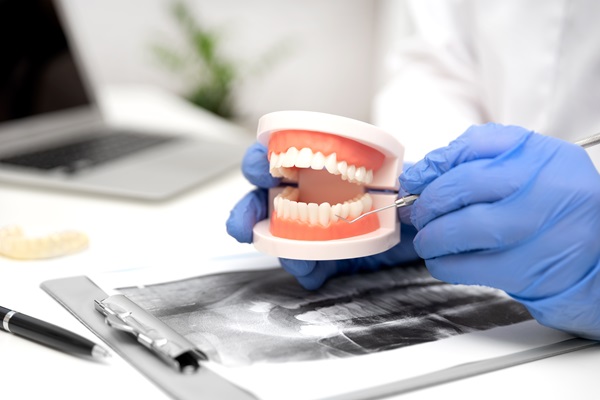How to Prevent Denture Stomatitis

Denture stomatitis can affect patients who wear dentures, bringing uncomfortable symptoms like redness and inflammation. However, there are simple ways to prevent this condition. From consistent oral hygiene to denture relines, patients can wear dentures comfortably and without any issues.
What is denture stomatitis?
Denture stomatitis is a fairly common condition that causes inflammation in the soft tissues beneath a set of dentures, most often on the upper palate. Although the term might sound serious, it usually does not cause pain at first, which is why it often goes unnoticed without routine dental care. It is most often linked to poor denture hygiene or wearing dentures continuously, especially overnight.
Denture stomatitis is not exclusive to older patients and may occur in anyone who wears removable dentures. While it is not considered a serious health issue, it can contribute to discomfort, alter denture fit, and increase the risk of further oral infections if left untreated.
Common symptoms and causes
Denture stomatitis develops gradually and may go unnoticed in its early stages. Some of the most common symptoms include persistent redness under the denture, swelling of the palatal tissue, and, in some cases, small red dots resembling a rash. Although typically not painful, a burning sensation or slight discomfort may occasionally be reported, particularly when consuming hot or spicy foods.
This condition is frequently associated with poor denture hygiene, which allows yeast to thrive beneath the appliance. Constant denture wear creates a warm and moist environment that promotes fungal overgrowth, making it important to take dentures out at night. Ill-fitting dentures that cause friction or pressure points may also compromise tissue health and increase susceptibility to inflammation. Additional risk factors include dry mouth, smoking, nutritional deficiencies, and systemic conditions such as diabetes, which can weaken immune responses and create an environment more prone to oral infections.
Medications that reduce saliva flow can exacerbate the risk. The same is true if a patient uses dentures without regular relining or adjustments. Even when dentures appear clean, microscopic biofilm can accumulate on them over time, leading to microbial imbalance.
Preventing denture stomatitis
Maintaining a clean oral environment and properly caring for dentures are the most effective ways to prevent denture stomatitis. These actions also help extend the lifespan and comfort of the denture itself. Here are five oral and denture care tips that can help reduce the risk of denture stomatitis:
- Clean dentures daily with a soft brush and non-abrasive cleanser — avoid using regular toothpaste
- Remove dentures at night to let oral tissues rest and stay healthy
- Rinse dentures after eating to clear food debris and reduce plaque buildup
- Soak dentures overnight in a denture-cleaning solution or clean water
- Stay hydrated to flush bacteria out of the mouth and, if needed, address symptoms of dry mouth
It is also important to visit the dentist regularly for checkups and cleanings. They can discuss when it is time to replace or reline dentures, such as if they become loose or cause pressure points. Not only are properly fitting dentures more comfortable, but they lower the chances of developing denture stomatitis.
Learn more about how to prevent denture stomatitis
With the right care and habits, denture stomatitis is easily preventable. A dentist can provide additional, more detailed prevention tips during an appointment. Contact our Pittsburg office today to schedule an appointment.
Request an appointment here: https://smilesolutionspittsburg.com or call Smile Solutions at (620) 670-9817 for an appointment in our Pittsburg office.
Check out what others are saying about our dental services on Yelp: Dentures and Partial Dentures in Pittsburg, KS.
Related Posts
Restoring your damaged tooth with a dental filling is an easy procedure. It can stop the tooth’s damage from worsening. The general dentist will share aftercare instructions to enhance your oral health. Here are the ways a dental filling can elevate your oral health.Studies reveal that the enamel is the strongest substance in the body.…
Curious about dental fillings? Read on to learn more. Tooth cavities can be uncomfortable and a dental filling is necessary to resolve the issue. Your best bet is to prevent the condition from occurring in the first place. That requires a strict oral hygiene routine and regular dental checkups with a general dentist. Dental appointments…
A dental filling can preserve oral health by addressing cavities and restoring damaged teeth. This essential procedure prevents further tooth decay and protects the affected tooth from more extensive damage. By removing decayed material and filling the cavity, this treatment ensures that the tooth remains functional and intact, providing both immediate and long-term benefits for…
When a sports-related collision or fall occurs, an emergency dentist helps protect teeth, gums, and the jawbone from lasting harm. Dental trauma often looks minor at first, yet hidden cracks or nerve injuries may develop quickly. Acting fast supports comfort now and better outcomes later. Knowing what first steps to take can make all the…
